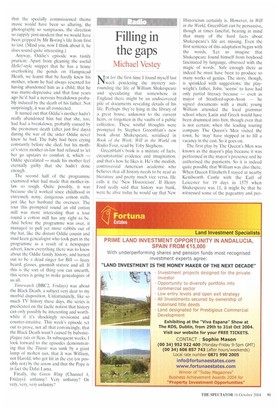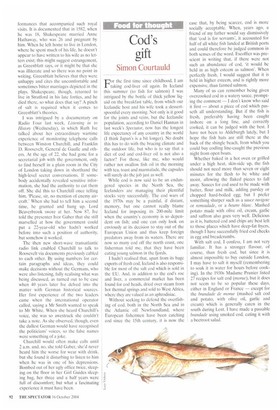Filling in the gaps
Michael Vestey
Not for the first time I found myself last week pondering the mystery surrounding the life of William Shakespeare and speculating that somewhere in England there might be an undiscovered pile of documents revealing details of his life. Perhaps they're lying in the library of a great house, unknown to the current heirs, or forgotten in the vaults of a public collection, These wistful thoughts were prompted by Stephen Greenblatt's new book about Shakespeare, serialised in Book of the Week: Will in the World on Radio Four, read by Toby Stephens.
Greenblatt's book is a mixture of facts, circumstantial evidence and imagination, and that's how he likes it. He's the modish, controversial American academic who believes that all history needs to be read as literature and pretty much vice versa. He calls it the 'New Historicism'. If Henry Ford really said that history was bunk, were he alive today he would say that New
Historicism certainly is. However, in Will in the World, Greenblatt can be persuasive, though at times fanciful, bearing in mind that many of the hard facts about Shakespeare's life are missing. Even the first sentence of this adaptation began with the words, 'Let us imagine that Shakespeare found himself from boyhood fascinated by language, obsessed with the magic of words.' Safe enough there as indeed he must have been to produce so many works of genius. The story, though, is sprinkled with suggestions: the playwright's father, John, 'seems' to have had only partial literacy because — even as mayor of Stratford-upon-Avon — he signed documents with a mark; young William attended the local grammar school where Latin and Greek would have been drummed into him, though even that is not certain; when the leading touring company The Queen's Men visited the town, he 'may' have stepped in to fill a vacancy in the cast. So it goes on.
The first play by The Queen's Men was known as the mayor's play because it was performed in the mayor's presence and he authorised the payments. So it is indeed quite possible that William was also there. When Queen Elizabeth I stayed at nearby Kenilworth Castle with the Earl of Leicester for 19 days in 1575 when Shakespeare was 11, it might be that he witnessed some of the pageantry and per formances that accompanied such royal visits. It is documented that in 1582, when he was 18. Shakespeare married Anne Hathaway, who was 26 and pregnant by him. When he left home to live in London, where he spent much of his life, he doesn't appear to have written to his wife as no letters exist; this might suggest estrangement, as Greenblatt says, or it might be that she was illiterate and so there was no point in writing. Greenblatt believes that they were unhappy and cites the uncomfortable and sometimes bitter marriages depicted in the plays. Shakespeare, though, returned to live in Stratford in his late forties, and he died there, so what does that say? A pinch of salt is required when it comes to Greenblatt's theories.
I was intrigued by a documentary on Radio Four last week, Listening in to History (Wednesday), in which Ruth lye talked about her extraordinary wartime experience of monitoring telephone calls between Winston Churchill, and Franklin D. Roosevelt, General de Gaulle and others. At the age of 22, she had gone for a secretarial job with the government, only to find herself in a plain room in the City of London taking down in shorthand the high-level secret conversations. If somebody accidentally revealed sensitive information, she had the authority to cut them off. She did this to Churchill once telling him, 'Please, sir, no mention of enemy aircraft.' When she had to tell him a second time, he grunted and hung up. Lord Beaverbrook swore at her. Now 87, lye told the presenter Ivor Gaber that she still marvelled at how the government could put a 22-year-old who hadn't worked before into such a position of authority, but somehow it worked.
The then new short-wave transatlantic radio link enabled Churchill to talk to Roosevelt via documents previously cabled to each other. By using numbers for certain paragraphs and ideas, they could make decisions without the Germans, who were also listening, fully realising what was being discussed, as turned out to be case when 40 years later Tye delved into the matter with German historical sources. Her first experience of the two leaders came when the international operator called, saying a Mr Smith wanted to speak to Mr White. When she heard Churchill's voice, she was so awestruck she couldn't take a note. As she observed, though, even the dullest German would have recognised the politicians' voices, so the false names were something of a joke.
Churchill would often make calls until 2 a.m. and, no, she told Gaber, she'd never heard him the worse for wear with drink, but she found it disturbing to listen to him when he was in one of his depressions. Bombed out of her ugly office twice, sleeping on the floor in her Girl Guides sleeping bag, her three and a half years were full of discomfort; but what a fascinating experience it must have been.











































































































 Previous page
Previous page